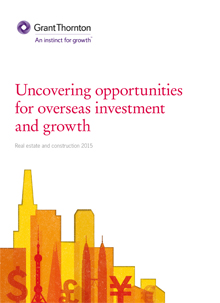Combining reason and instinct to reveal new opportunities for growth
Soft power and gut instinct is driving an estimated US$250bn per year in overseas real estate investment1, showing that feeling rather than data analysis determines many investment decisions. This comes amid a surge of overseas real estate activity as investors seek new bedrocks of political stability. However, this reliance on instinct, while important, can lead investors to miss emerging pockets of opportunity if not complemented by deeper analysis and local expertise.
Drawing on interviews with investors, industry experts and Grant Thornton real estate specialists this report provides practical, achievable actions for investors looking to harness the forces shaping global real estate activity.
Key findings
Identifying emergent stability: a post-crash sensibility and concerns about geo-political risks are driving investors towards low-risk opportunities. While secure returns will come from stable regions, there are valuable opportunities in territories that have recently become investment or developer friendly.
Demographic trends driving new opportunities: population shifts are changing real estate investment opportunities, but not always in the most obvious ways. Use local insight to make informed decisions, because what works in one culture or region might not fit another.
Soft power and its limitations: familiarity with target territories is often a key factor in investment decisions. While cultural familiarity and gut instinct should never be ignored, investors must ensure decisions are complemented by solid evidence that models all risks and potential returns.
The opportunities of urbanisation: new opportunities in lesser known areas are opening up as established cities become saturated and population growth slows. Savvy investors can benefit by getting into secondary markets whilst the costs of entry are low.
When seeking politically stable environments to invest in, investors need to apply sufficient analysis to check their initial assumptions about which countries offer safe harbour. To back the best overseas projects, engage with local experts to understand residential and commercial preferences in the region.
1Grant Thornton International Business Report, Q2 2015
Read full report

